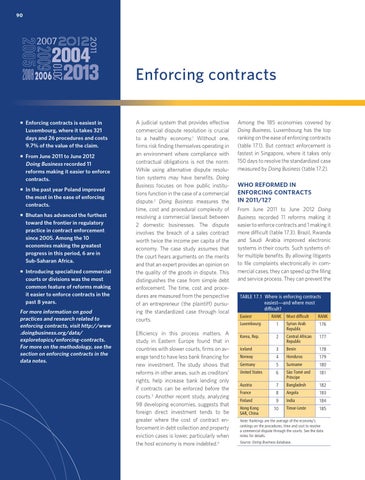90
Enforcing contracts Enforcing contracts is easiest in Luxembourg, where it takes 321 days and 26 procedures and costs 9.7% of the value of the claim. From June 2011 to June 2012 Doing Business recorded 11 reforms making it easier to enforce contracts. In the past year Poland improved the most in the ease of enforcing contracts. Bhutan has advanced the furthest toward the frontier in regulatory practice in contract enforcement since 2005. Among the 10 economies making the greatest progress in this period, 6 are in Sub-Saharan Africa. Introducing specialized commercial courts or divisions was the most common feature of reforms making it easier to enforce contracts in the past 8 years.
For more information on good practices and research related to enforcing contracts, visit http://www .doingbusiness.org/data/ exploretopics/enforcing-contracts. For more on the methodology, see the section on enforcing contracts in the data notes.
A judicial system that provides effective commercial dispute resolution is crucial to a healthy economy.1 Without one, firms risk finding themselves operating in an environment where compliance with contractual obligations is not the norm. While using alternative dispute resolution systems may have benefits, Doing Business focuses on how public institutions function in the case of a commercial dispute.2 Doing Business measures the time, cost and procedural complexity of resolving a commercial lawsuit between 2 domestic businesses. The dispute involves the breach of a sales contract worth twice the income per capita of the economy. The case study assumes that the court hears arguments on the merits and that an expert provides an opinion on the quality of the goods in dispute. This distinguishes the case from simple debt enforcement. The time, cost and procedures are measured from the perspective of an entrepreneur (the plaintiff) pursuing the standardized case through local courts. Efficiency in this process matters. A study in Eastern Europe found that in countries with slower courts, firms on average tend to have less bank financing for new investment. The study shows that reforms in other areas, such as creditors’ rights, help increase bank lending only if contracts can be enforced before the courts.3 Another recent study, analyzing 98 developing economies, suggests that foreign direct investment tends to be greater where the cost of contract enforcement in debt collection and property eviction cases is lower, particularly when the host economy is more indebted.4
Among the 185 economies covered by Doing Business, Luxembourg has the top ranking on the ease of enforcing contracts (table 17.1). But contract enforcement is fastest in Singapore, where it takes only 150 days to resolve the standardized case measured by Doing Business (table 17.2).
WHO REFORMED IN ENFORCING CONTRACTS IN 2011/12? From June 2011 to June 2012 Doing Business recorded 11 reforms making it easier to enforce contracts and 1 making it more difficult (table 17.3). Brazil, Rwanda and Saudi Arabia improved electronic systems in their courts. Such systems offer multiple benefits. By allowing litigants to file complaints electronically in commercial cases, they can speed up the filing and service process. They can prevent the TABLE 17.1 Where is enforcing contracts easiest—and where most difficult? Easiest
Most difficult
RANK
Luxembourg
1
Syrian Arab Republic
176
Korea, Rep.
2
Central African Republic
177
Iceland
3
Benin
178
Norway
4
Honduras
179
Germany
5
Suriname
180
United States
6
São Tomé and Príncipe
181
Austria
7
Bangladesh
182
France
8
Angola
183
Finland
9
India
184
Timor-Leste
185
Hong Kong SAR, China
RANK
10
Note: Rankings are the average of the economy’s rankings on the procedures, time and cost to resolve a commercial dispute through the courts. See the data notes for details. Source: Doing Business database.
